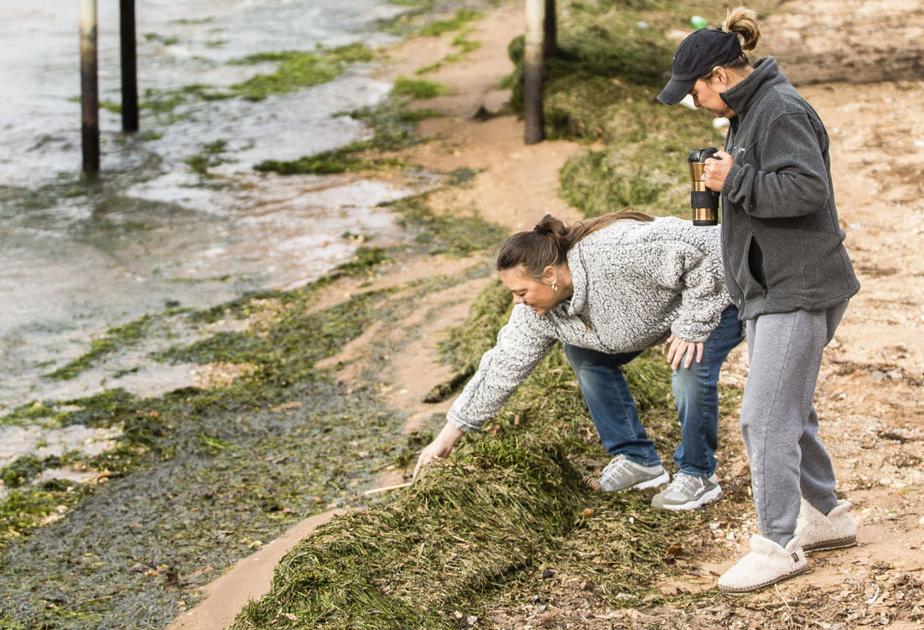Homeowners, TVA struggling with aquatic plant life in river - Times Daily
Homeowners, TVA struggling with aquatic plant life in river - Times Daily |
| Homeowners, TVA struggling with aquatic plant life in river - Times Daily Posted: 18 Jan 2020 10:15 PM PST  For Black's Landing neighbors Peggy Atkins and Darlene Rogers, long aquatic grass from the Tennessee River is an unwanted visitor, and they want the Tennessee Valley Authority to do something about it. Eel grass and hydrilla are lining the shores behind their upscale homes south of Tanner, limiting their enjoyment and use of watercraft in the river. "We've cleaned it off our beach area in the morning, and another batch of grass has filled up the beach again by the afternoon or the next morning. It's not going to go away on its own," Atkins said. "I work on the beach constantly. It's very heavy to rake. It's been a stinky mess with dead fish wrapped in it sometimes." TVA said the grass on the shore is "a natural occurrence" and not the responsibility of the federal agency. "It's nothing we've done," said TVA spokeswoman Malinda Hunter. "It's dead grass washing down the river. Mother Nature controls that, not us." Stephen Turner, program manager of TVA's Aquatic Plant Management program, and TVA retiree and contractor Dave Webber traveled up and down the river and Wheeler Lake on an airboat monitoring the vegetation in October. Turner said TVA saw eel grass in higher volumes in 2018. "Mother Nature sent weather patterns our way that were favorable for growth, so it's taking a bit longer to see the grass die off this year," Turner said. He said typically, eel grass begins to die off in early October and the grass breaks off and moves downstream through mid-winter. "Another reason we may be seeing more volume is due to rainfall. More rain means more water moving downstream and pulling plant debris along with it," he said. Turner added a licensed aquatic applicator should be used for weed management, but in this case it could be a waste of money. "The grass washing up right now is mainly non-viable fragments just passing through. Eel grass growth can be treated in the spring," he said. Troy Goldsby, president of Aqua Services Inc., a licensed applicator service firm based in Guntersville, said applications to curb eel grass and hydrilla usually cost between $250 and $500, and half-acre boat dock areas might need three to four applications each year. "We're having a lot of reports of eel grass on Wheeler Lake right now," said Goldsby, whose company handles aquatic vegetation throughout the Southeast. "Hydrilla treatment will be on the lower end of the price range." Rogers said this past summer the grass "started piling up on our property." "It's a shame we're having to deal with it," said Rogers, who has owned the riverfront property for five years, and built a house on the Black's Landing lot in south Athens three years ago. "This summer it was nearly impossible to swim, and now the grass is such a nuisance. It's an added expense we didn't expect." Rogers said she has reached out to TVA but hasn't heard back. Hunter said there was a drought and then heavy rain during the past several months that could have led to the dead grass moving down the river. "It's the property owner's responsibility," she said. "They took on that responsibility when they chose to live on the river." TVA said it works diligently to keep the public's access to recreational opportunities on the river clear. "We treat for aquatic plants at the public areas and maintain the public recreational areas to promote access to the reservoirs," TVA spokesman Scott Fiedler said. "It's like mowing the lawn." He said from spring to fall, a TVA crew tries to manage aquatic plants. He suggested Alabama homeowners having a problem with overgrown aquatic plants hire a licensed contractor to treat them. "It's not a do-it-yourself job," he said. "It's a constant battle with Mother Nature. Hydrilla is considered the kudzu of the river. Sometimes its stem might grow 4 inches a day." The Alabama Department of Conservation and Natural Resources and TVA said aquatic plant species like hydrilla and milfoil are not native to Tennessee River. Both agencies said the plants were introduced to the river by fishermen, boaters and people who might dump fish tanks or water garden plants into the river. TVA suggested boaters remove all plant materials from boats, trailers, bilges, live wells and other equipment. "Plant only native species around shorelines," TVA said in a statement. "While non-native species like ornamental lilies and water hyacinth are beautiful, they will quickly spread if introduced into the river. … Dispose of any unwanted plants in the garbage." |
| You are subscribed to email updates from "beautiful fish tanks" - Google News. To stop receiving these emails, you may unsubscribe now. | Email delivery powered by Google |
| Google, 1600 Amphitheatre Parkway, Mountain View, CA 94043, United States | |
Comments
Post a Comment